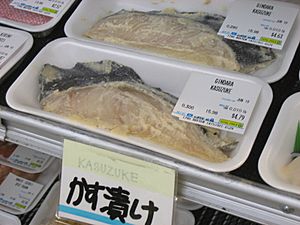Kasuzuke facts for kids
Kasuzuke (pronounced kah-soo-zoo-keh) is a special Japanese food. It's made by pickling fish or vegetables. The secret ingredient is "sake kasu." This is the leftover yeast from making sake, a Japanese rice wine. It gives Kasuzuke a unique and delicious flavor!
Contents
A Taste of History
Kasuzuke has a very long history in Japan. People started making it in the Kansai region over 1,200 years ago. That was during the Nara period!
How Kasuzuke Began
At first, vegetable kasuzuke was called shiru-kasu-zuke or Narazuke. It was often made with white melon. Later, people used other vegetables like cucumbers and eggplants.
Buddhist monks first made this food. Samurai warriors also used it. It was a great food for wartime because it lasted a long time.
Spreading Across Japan
In the 1600s, during the Edo period, a sake seller helped make Kasuzuke very popular. It spread all over Japan. Today, it's still a favorite dish! You can also find it made with carrots, watermelon rind, and ginger.
How Kasuzuke is Made
Making Kasuzuke involves a special pickling process. The main ingredient is sake kasu, which is like a paste or sheet.
Making Vegetable Kasuzuke
For vegetable kasuzuke (shiru-kasu-zuke), the vegetables are pickled in a mix of sake-kasu, mirin (a sweet cooking wine), sugar, and salt. Sometimes, ginger or citrus is added for extra flavor.
The pickling time for vegetables can be very long. It can take from one to three years! Younger pickles are eaten in the summer. Older ones turn an amber color and are sold as Narazuke.
Making Fish Kasuzuke
To make fish kasuzuke, the process is a bit different. Sometimes, sugar is not used. Instead, sake, soy sauce, pepper, or ginger might be added.
Common fish used include cod, salmon, and butterfish. The fish usually pickles for a few days.
What Does Kasuzuke Taste Like?
Kasuzuke has a unique and interesting taste.
Flavor and How to Eat It
Vegetable kasuzuke is usually sweet and mild. It's eaten like other pickles.
Fish kasuzuke has a mild but strong flavor. You can eat it raw, or it's often grilled and served over rice. It's a delicious way to enjoy fish!
See also
 In Spanish: Kasuzuke para niños
In Spanish: Kasuzuke para niños
 | Georgia Louise Harris Brown |
 | Julian Abele |
 | Norma Merrick Sklarek |
 | William Sidney Pittman |


